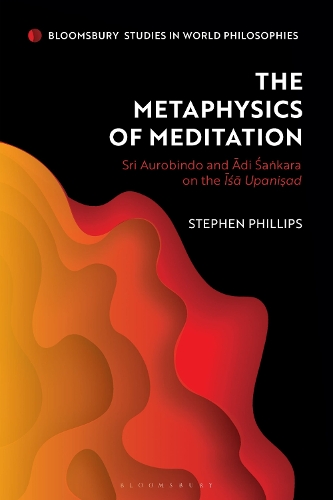
The Metaphysics of Meditation: Sri Aurobindo and Adi-Sakara on the Isa Upanisad
(Paperback)
Available Formats
Publishing Details
The Metaphysics of Meditation: Sri Aurobindo and Adi-Sakara on the Isa Upanisad
By (Author) Stephen Phillips
Bloomsbury Publishing PLC
Bloomsbury Academic
24th July 2025
United Kingdom
Classifications
Professional and Scholarly
Non Fiction
Philosophy of religion
Hinduism
Mind, body, spirit: meditation and visualization
Philosophy: metaphysics and ontology
294.59218
Physical Properties
Paperback
248
Width 158mm, Height 236mm, Spine 22mm
400g
Description
In this book Stephen Phillips focuses on one of the most important poems about meditation in world literature, as understood by two of the greatest philosophers of India, one classical, one modern. Sankaras commentaries on the Upanisads are a core of the Vedanta tradition and Aurobindo is a towering figure of 20th-century Hindu thought. This is the first time their approaches have been studied together. The Isa (c. 500 BCE) an Upanisad belongs to a genre of adhyatmika learningconcerning self and consciousnessin early Indian literature. According to the Ancient Indian tradition of yoga, meditation is antithetical to willful bodily and mental action. Breathing is all you do. In the conception of the Isa Upanisad, we are told that the best that comes from meditation is because of what the Lord is. In Sankara's interpretation it comes to block out the little you, whereas according to Aurobindo it comes as a divine connection, an occult Conscious Force belonging to truer part of oneself, atman, and an opening to that selfs native energy. Framed around Aurobindos translation of each of the Isas eighteen verses, along with a translation of each verse, Phillips follows a different reading of Sankara as laid out in his commentary. All this is done against the backdrop of modern scholarship. Convergences and divergences of these streams are the focus throughout. Appendix A presents the Upanisad with the two readings side by side. This book traces a worldview and consonant yoga teaching common to two authors who are typically taken to be oceans apart, not only chronologically but in intellectual stance. Addressing a huge gap in the contemporary literature on meditation in the Hindu traditions, Phillips presents a compelling new way of thinking about meditation in the Advaita Vedanta philosophy and Upanisad.
Reviews
The Metaphysics of Meditation is a deeply insightful study of Sankaras and Aurobindos engagement with the Isa Upanisad. With his characteristic textual and analytical rigor, Phillips addresses important issues in metaphysics, philosophy of consciousness, philosophy of meditation, and the interpretation of Vedanta. It will be of great interest to scholars in philosophy, religion, and consciousness studies. * Matthew MacKenzie, Professor of Philosophy, Colorado State University, USA *
Prevailing scholarship assumes irreconcilable differences in Sankaras and Aurobindos Vedantic worldviews. Stephen Phillips challenges this through a critical comparison of their commentaries on the Isa Upanisad. He reveals overlooked convergences, and provides novel perspectives on the entanglements of meditation and yogic phenomenology with metaphysics. In the process, Phillips invites readers to bridge the temporal, cultural, and philosophical gaps between two of South Asias most influential thinkers. * Neil Dalal, Associate Professor of Philosophy, University of Alberta, Canada *
In this remarkable book, Stephen Phillips offers a provocative new study of the Isa Upanisad that is admirably attentive to its literary, philosophical, and spiritual dimensions. More controversially, he claims to find common ground between Sankara and Sri Aurobindousually considered to be worlds apartin their reflections on the metaphysical and meditative teachings in the scripture. * Swami Medhananda, Senior Research Fellow in Philosophy at the Vedanta Society of Southern California and Hindu Chaplain at UCLA and the University of Southern California, USA *
The Metaphysics of Meditation revisits academic clichs nuancing the vulgata contrasting Shankaras and Sri Aurobindos standpoints and emphasizing their convergences on the basis of both an erudite close-reading of their sources and a pragmatic argument: for both philosophers metaphysics and self-knowledge-through-practice, intellectual and yogic knowledge, must be understood as mirroring one another and guaranteeing their respective validity. * Benedetta Zaccarello, Senior Researcher, ITEM (French National Centre for Scientific Research / cole Normale Suprieure Paris), France *
Author Bio
Stephen Phillips is Professor Emeritus of Philosophy and Asian Studies at the University of Texas at Austin, USA.
